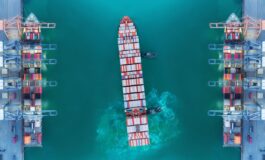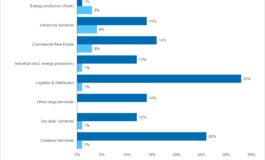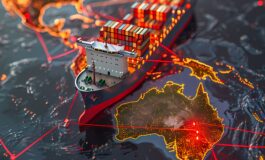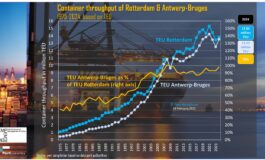
Featured


Featured
Digital technologies for efficient and resilient sea-land logistics
PortEconomics member Francesco Parola, during the annual conference of the International Association of Maritime Economists, held 25-27 June 2025, in Bergen, Norway, delivered a presentation on “Digital Technologies for Efficient and Resilient Sea-Land Logistics: IT-Based Decision Support Systems to Manage Highway Capacity of Major Gateway Ports”. Francesco examines the crucial role of road transport in port competitiveness and emphasises the necessity for improved coordination between maritime and inland logistics....
Featured
Stakeholders’ attitudes toward container terminal automation
Do you want to understand better why fewer than 80 container terminals are automated? PortEconomics members Theo Notteboom, Thanos Pallis & Geraldine Knatz examine stakeholders' attitudes toward container terminal automation, aiming to place terminal automation as an innovation trajectory in the broader context of stakeholder relations management. More specifically, their port study: Position terminal automation as an innovation trajectory within the broader context of stakeholder relations...
Featured
The World Ports Tracker in TOC Europe
PortEconomics member Theo Notteboom, joined TOC Worldwide'’s #TOCEurope conference in Rotterdam and the plennary session on the container market trade outlook, with an intervention explaining results of the World Ports Tracker on #resilience and ports sentiments on container shipping growth prospects His presentation focused on key market-related findings of the World Ports Tracker report of the International Association of Ports and Harbours (IAPH), which Theo Notteboom and Thanos...
Featured
In a tight spot: American ports in global supply chains
PortEconomics member Jean-Paul Rodrigue delivered a testimony in front of the Joint Economic Committee of the Congress of the United States, in Washington, DC. The hearing was on "Barriers to Supply Chain Modernisation and Factor Productivity Enhancements". Jean-Paul's contribution focused on the main barriers that North American ports, particularly container ports, are facing. He suggested a greater autonomy for port authorities with expanded governance. Many are landlords who may be required to act more as entrepreneurs.The full...
Featured
Toward green container liner shipping: joint optimization of heterogeneous fleet deployment, speed optimization, and fuel bunkering
Container liner shipping companies, under the international shipping carbon reduction indicators proposed by the International Maritime Organisation, must transform two key aspects: technology and operations. PortEconomics member Theo Notteboom, along with Yuzhe Zhao, Zhongxiu Peng (Dalian Maritime University), Jingmiao Zhou (Dalian University of Foreign Languages), Yiji Ma (Dalian Maritime University) defined a green liner shipping problem (GLSP) that integrates the deployment of a heterogeneous fleet, speed determination, and fuel...
Featured
Investments and financing challenges of the EU’s port managing bodies; findings from a comprehensive survey
The ‘port managing body (PMB)’ plays a central role in the development of the port. Public funding for investment projects of the port managing bodies is common in the EU and most other countries.PortEconomics member Peter de Langen adds to the body of knowledge on port investments and financing challenges with an analysis of data from two surveys that were carried in 2018 and 2023.This analysis yields the following conclusions. First, the PMBs in the EU have shifted their investments, in response to changing investment drivers. The...
Featured
Newly-upgraded IAPH World Ports Tracker identifies major sustainability and market trends
World ports are executing on planned infrastructure investments, community building and environmental sustainability initiatives. Important gaps have been identified in future fuels readiness, carbon emissions reporting, digitalisation and gender equality. Market trends indicate overall lower container port productivity due to larger ships with increased call sizes and less frequent calls; gains and losses on liner connectivity are split, influenced by geopolitics The survey results of IAPH’s most-engaged ports from around the...
Featured
Container alliance strategies, market concentration and equality: A dynamic time warping clustering approach
In a recent study published in the scholarly journal Transport Policy, Richard Borggreve and PortEconomics member Gordon Wilmsmeier examine the evolving strategies of container shipping alliances and their implications for market concentration and equality across trade routes. The study introduces Dynamic Time Warping (DTW), a technique traditionally applied in time series analysis, to cluster global trade routes based on alliance deployment patterns. This approach enables the researchers to uncover temporal similarities and shifts in...
Featured


